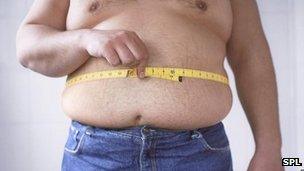Obesity study in Aberdeen looks at snacking
- Published

The researchers hope to discover why people snack in a bid to tackle the obesity problem
Researchers attempting to learn why people snack are to study the health and habits of more than 100 Scots.
It is part of a Scottish government drive to tackle the obesity problem.
The team at Aberdeen's Rowett Institute of Nutrition and Health are hoping to recruit 120 volunteers who will be monitored over the course of a week.
Researchers will record their heart rates, activity levels and snacking habits using heart sensors, GPS devices and an electronic diary.
The scientists are hoping to identify a link between so-called "executive functions" in the brain and snacking.
Dr David McMinn, from the institute, who is leading the study, said: "We live in an environment where snack foods are readily available, and where desk jobs and labour-saving devices mean that we are less active than in previous generations.
"Because our environment makes it easy to consume high-calorie snack foods and spend long periods of time inactive, eating well and being active requires considerable self-regulation.
"It requires us to make an effort, such as deciding not to snack in order to maintain a healthy weight."
'Stressful situations'
Researchers at Aberdeen University are trying to find out why we snack between meals
He added: "We are particularly interested in the way food choices and physical activity behaviours are linked to psychological processes in the brain called the 'executive functions'.
"We use executive functions to achieve goals, for example, planning actions in advance, solving problems, ignoring distractions and resisting temptations.
"The executive functions can be depleted if used intensively, or due to particularly stressful situations. We are interested to know if reductions in executive functions are associated with behaviours such as snacking on unhealthy foods or sedentary behaviour."
Researchers hope to recruit 120 people, over 18, who are not taking beta-blockers and who are able to attend the university's health sciences building on the Foresterhill campus to take part in psychological testing ahead of the seven-day monitoring period.
"Information from the different monitoring devices will be used to identify where periods of snacking, activity, sedentary behaviour, and stress occur," Dr McMinn said.
"The aim is to try to understand why people snack, because we all know that sticking to a healthy diet is easier said than done."
- Published30 April 2013
- Published7 March 2012
- Published25 October 2011
- Published29 June 2011
- Published27 September 2010
- Published31 August 2010